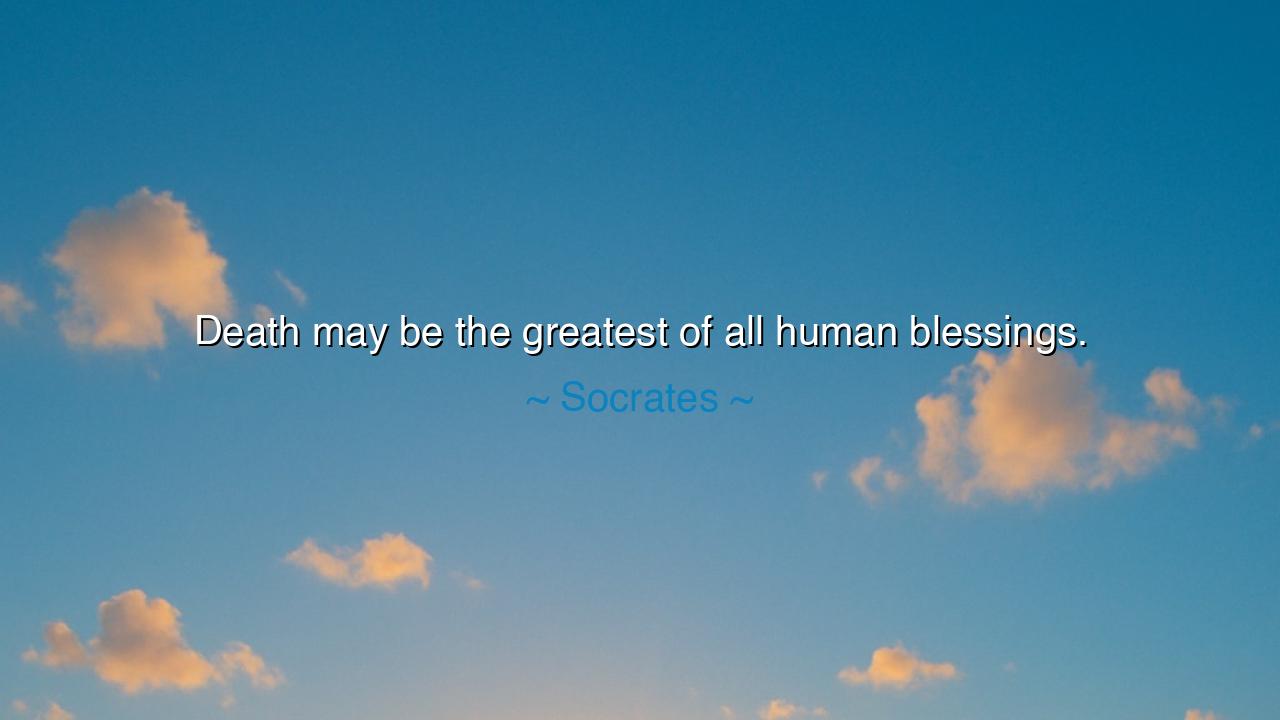
Death may be the greatest of all human blessings.






The words of Socrates, “Death may be the greatest of all human blessings,” flow from the serene depths of one who looked upon eternity without fear. Spoken before his execution, they were not the utterance of despair but of wisdom — the calm reflection of a man who had lived in truth and sought to understand the mystery of existence. To the unwise, death is terror; to the philosopher, it is a transition — a door, not an end. In this single sentence, Socrates overturned the dread that binds mankind, teaching that even in dying, there is blessing, for death may free the soul to what life could not reveal.
In the days of ancient Athens, Socrates stood accused of corrupting youth and dishonoring the gods. Yet before his judges, he did not plead for mercy. Instead, he spoke of ignorance and knowledge, of fear and acceptance. He reminded them that no man truly knows what death is — and that to fear what one does not understand is the folly of the unexamined life. “For all we know,” he said, “death may be the greatest good.” This was the origin of his immortal line, born not in comfort but in defiance of injustice — the serenity of a mind that had conquered fear itself.
To the ancients, death was not an enemy but a return. The Egyptians called it the journey to the Field of Reeds; the Stoics called it the dissolution of form into nature’s eternal rhythm. Socrates, however, went deeper. For him, the blessing of death lay in its power to purify — to separate the eternal soul from the fleeting distractions of the flesh. In dying, one is stripped of pretense, of wealth, of ambition — all that blinds the spirit. Death, therefore, is not punishment, but liberation. It returns man to the realm of truth from which he came.
Consider, too, how history has mirrored this teaching. When Galileo, centuries later, stood before his inquisitors, forced to recant the truth that the Earth moves, he faced the same choice: to cling to life in silence or to risk it in truth. Though he chose life, his spirit — like Socrates’s — declared that death is not the worst of evils. And when Joan of Arc faced the flames, her final words were not of despair but of conviction: “Hold the cross high, so I may see it through the flames.” Like Socrates, she understood that what can be destroyed by death is not the soul’s true self. The body perishes; the purpose endures.
Socrates also meant that death blesses life itself, for it gives it urgency and meaning. If man were immortal in body, he would drift without purpose, forgetting the value of every moment. Death, by its certainty, gives weight to choice, sweetness to love, and courage to virtue. Knowing that our time is brief, we are compelled to live fully — to act with justice, to speak truth, to seek beauty. Thus, death becomes not an end but the teacher of wisdom, reminding us that all that is precious is fleeting, and all that is eternal lies within.
To say that death may be the greatest blessing is to declare that fear must never rule the soul. Socrates, by accepting his fate, showed that peace comes not from denying mortality but from embracing it. The true philosopher dies before death — he releases attachment, ego, and illusion long before his final breath. And when that moment comes, he greets it as an old friend, knowing that only the husk falls, while the essence rises. Such a soul is never conquered, for it has learned to see beyond the shadow into the light.
So, my listener, take this teaching as an ancient seed of courage: Do not flee from death, but learn from it. Live as if every breath were sacred, every sunrise a gift, and every farewell a lesson in love. Seek not to escape mortality, but to transcend it through goodness, truth, and purpose. For when the hour comes, if you have lived rightly, death will not take from you — it will restore you. And in that moment, you too shall understand, as Socrates did, that the greatest of all blessings is not to live forever, but to live fearlessly.






AAdministratorAdministrator
Welcome, honored guests. Please leave a comment, we will respond soon